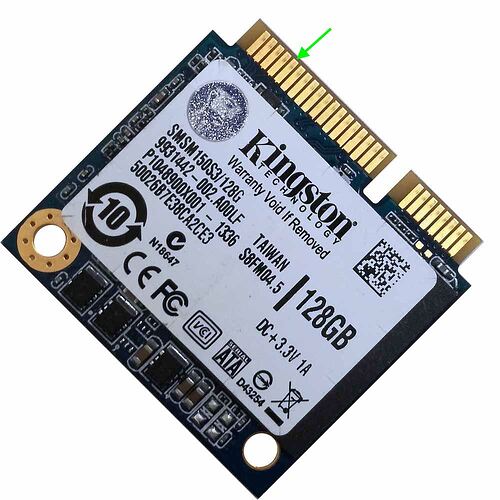I purchased a LEVEN mSATA SSD 1TB 3D NAND TLC SATA III. Installed it according to this video.
After rebooting, the card/drive is not visible.
# lsblk -o NAME,SIZE,MOUNTPOINT,STATE,FSTYPE,MODEL,SERIAL,UUID,LABEL
NAME SIZE MOUNTPOINT STATE FSTYPE MODEL SERIAL UUID LABEL
mtdblock0 1M
mtdblock1 7M
mmcblk0 7.3G 0x0ea2ec8d
└─mmcblk0p1 7.3G / btrfs 03e745f9-b279-4219-bca9-45ff92000aec
mmcblk0boot0 4M
mmcblk0boot1 4M
Any suggestions?
jklaas
2
I think it’s better to try more fundamental things first than lsblk.
Can you see the drive using dmesg?
Also, it should be listed in /dev as /dev/sdX
I’m not sure lsblk will see devices that haven’t been partitioned.
I’m not seeing it in either location.
Can you see the drive using dmesg?
# dmesg | grep dev
[ 0.000330] Console: colour dummy device 80x30
[ 0.002148] devtmpfs: initialized
[ 3.120666] usbcore: registered new device driver usb
[ 4.254864] 2 fixed-partitions partitions found on MTD device spi0.0
[ 4.711512] i2c /dev entries driver
[ 4.725492] (NULL device *): hwmon_device_register() is deprecated. Please convert the driver to use hwmon_device_register_with_info().
[ 4.825357] marvell-cesa f1090000.crypto: CESA device successfully registered
[ 4.990229] mmcblk0rpmb: mmc0:0001 H8G4a? partition 3 4.00 MiB, chardev (250:0)
[ 6.286908] Waiting 2 sec before mounting root device...
[ 8.374992] BTRFS: device fsid 03e745f9-b279-4219-bca9-45ff92000aec devid 1 transid 18137 /dev/root
[ 8.384671] BTRFS info (device mmcblk0p1): disk space caching is enabled
[ 8.391401] BTRFS info (device mmcblk0p1): has skinny extents
[ 8.403421] BTRFS info (device mmcblk0p1): enabling ssd optimizations
[ 8.415591] VFS: Mounted root (btrfs filesystem) on device 0:12.
[ 8.422596] devtmpfs: mounted
[ 10.993735] mount_root: mounting /dev/root
[ 10.998408] BTRFS info (device mmcblk0p1): disk space caching is enabled
[ 13.117742] device-mapper: ioctl: 4.37.0-ioctl (2017-09-20) initialised: dm-devel@redhat.com
[ 13.204348] tun: Universal TUN/TAP device driver, 1.6
[ 13.309165] cryptodev: driver 1.10 loaded.
[ 13.403084] input device check on
[ 13.753318] pci 0000:00:02.0: enabling device (0140 -> 0142)
[ 15.752081] pci 0000:00:03.0: enabling device (0140 -> 0142)
[ 18.030624] device lan0 entered promiscuous mode
[ 18.035304] device eth1 entered promiscuous mode
[ 18.138964] device lan1 entered promiscuous mode
[ 18.249801] device lan2 entered promiscuous mode
[ 18.401015] device lan3 entered promiscuous mode
[ 18.557620] device lan4 entered promiscuous mode
[ 18.562269] device eth0 entered promiscuous mode
[ 20.926570] ath10k_pci 0000:02:00.0: pdev param 0 not supported by firmware
[ 20.963177] device wlan1 entered promiscuous mode
[ 21.013731] device wlan0 entered promiscuous mode
Also, it should be listed in /dev as /dev/sdX
# ls /dev
autofs loop0 null tty22 tty45 ttyS1
btrfs-control loop1 port tty23 tty46 ttyS10
bus loop2 ppp tty24 tty47 ttyS11
console loop3 ptmx tty25 tty48 ttyS12
cpu_dma_latency loop4 pts tty26 tty49 ttyS13
crypto loop5 random tty27 tty5 ttyS14
full loop6 rtc0 tty28 tty50 ttyS15
fuse loop7 shm tty29 tty51 ttyS2
gpiochip0 mapper snd tty3 tty52 ttyS3
gpiochip1 mem tty tty30 tty53 ttyS4
gpiochip2 memory_bandwidth tty0 tty31 tty54 ttyS5
gpiochip3 mmcblk0 tty1 tty32 tty55 ttyS6
hwrng mmcblk0boot0 tty10 tty33 tty56 ttyS7
i2c-0 mmcblk0boot1 tty11 tty34 tty57 ttyS8
i2c-1 mmcblk0p1 tty12 tty35 tty58 ttyS9
i2c-2 mmcblk0rpmb tty13 tty36 tty59 ubi_ctrl
i2c-3 mtd0 tty14 tty37 tty6 urandom
i2c-4 mtd0ro tty15 tty38 tty60 vcs
i2c-5 mtd1 tty16 tty39 tty61 vcs1
i2c-6 mtd1ro tty17 tty4 tty62 vcsa
i2c-7 mtdblock0 tty18 tty40 tty63 vcsa1
i2c-8 mtdblock1 tty19 tty41 tty7 watchdog
kmsg net tty2 tty42 tty8 watchdog0
log network_latency tty20 tty43 tty9 zero
loop-control network_throughput tty21 tty44 ttyS0
Any other tests?
Thanks.
I had similar issue in the past.
The solution for me was a hardware hack. I have masked pin 43 of the msata drive using a masking tape.
1 Like
czlada
5
Do you have the NAS package installed in the foris?
Disk works on the computer or it doesn’t just go on in turris
Yes, I have the NAS package installed. I removed the mdadm package.
I was using the Omnia as a NAS, but I decided to simplify things and just us an internal mSATA drive.
jklaas
8
From this site, it looks like the pin on the opposite side. I think the side you have up is even pins.
I might be reading it wrong - NM, I think you have it right.
I masked pin 43 and viola, the device was found.
Masking pin 43 was painstaking work–sooo small.
Thanks for the help.
1 Like
tac2
10
Two - three layers of your favourite nailpolish 
1 Like
system
Closed
11
This topic was automatically closed 3 days after the last reply. New replies are no longer allowed.
